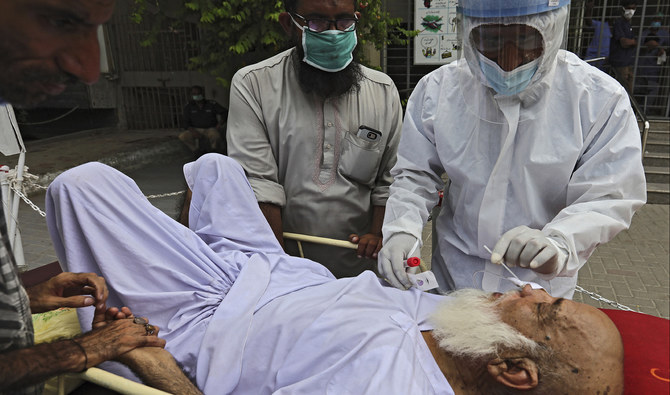ISLAMABAD: The coronavirus pandemic has amplified the critical need to speed up efforts for universal health care in Pakistan, shows a study published by Islamabad-based public policy think tank Tabadlab on Thursday.
Authored by entrepreneurial health care executive Dr. Muhammad Ali Chaudhry and public policy adviser Ammara Khan, the study points out that despite the introduction of programs and initiatives intended to improve the long-neglected state of public health in Pakistan, systemic weaknesses still prevail. The impact of these weaknesses has been perpetuated by the COVID-19 crisis, which reinforces the need to ensure effective crisis management and fast-track progress toward universal health care.
According to the paper, Pakistan ranks 154th out of 195 countries in terms of the quality and accessibility of its health care, which is far behind India (145th), China (48th), Sri Lanka (71st), Bangladesh (133rd) and Bhutan (134th).
The national health infrastructure serving the country’s 220 million population comprises 1,279 hospitals, 5,527 basic health units, 686 rural health centers, 5,671 dispensaries, 747 maternal and child health center and 441 tuberculosis centers. The total availability of beds in these health facilities is estimated at only 145,124.
Pakistan’s health care system is also severely understaffed. The paper shows that there are significantly fewer physicians, nurses, midwives, community health workers, pharmacists than the World Health Organization (WHO) recommends. Doctor to patient ratio in Pakistan 1:1,300, doctor nurse ratio is 1:2.7. The WHO suggests that doctor to patient ratio should be 1:1,000 and doctor nurse ratio 1:4. With such low levels of staffing, Pakistan is listed as one of 57 countries with a critical health workforce deficiency.
The study’s authors argue that with the current fiscal constraints on public health expenditure in Pakistan, it is necessary to explore alternative strategies for enhancing the efficiency of the health system. While the total public spending on health in Pakistan has increased in absolute terms year after year, the allocations as a percentage of GDP seem to be fluctuating significantly. Most recently, it peaked at a high of 1.2 percent in FY 2017-18 before slightly declining to 1.1 percent in 2018-19.
Since the devolution of health to the provinces, the proportion of government health spending has increased in all provinces and is accompanied by higher policy ownership for health. However, the working paper says, allocations are still inadequate to meet the country’s essential health needs and there is lack of strategic harnessing of other government and non-governmental sources of funding.
The paper notes that pressures on public health institutions from a rapidly growing population have allowed the private sector to service the gap created by an ever-increasing demand and limited public health facilities. Currently, there is a preference for private health care across the country, with 70 percent of the population paying out-of-pocket for treatment.
According to the study’s authors, the COVID-19 pandemic and its impact on the wider public health ecosystem, the economy, lives, livelihoods and wellbeing of people and communities across the country only reinforces the need for a “strong and resilient public health system, one that provides affordable high-quality health care and delivers effective crisis management.” Achieving health care universality, the researchers say, will result in improved staffing levels thereby new jobs, ancillary activities that support the sector, increased demand across value chain components and room for innovation and growth.
COVID-19 crisis shows universal health care critically needed in Pakistan — research
https://arab.news/6gm8s
COVID-19 crisis shows universal health care critically needed in Pakistan — research

- Lack of public health facilities results in 70 percent of Pakistanis paying out-of-pocket for treatment
- Pakistan ranks 154th out of 195 countries in terms of the quality and accessibility of its health care, far behind India and Bangladesh
Pakistani stocks breach 176,000 points barrier as investors expect further rate cuts

- Pakistani financial analyst attributes surge to falling inflation, investors expecting further policy rate cuts
- Pakistan’s finance ministry said Thursday that inflation had slowed to 5.6 percent year-on-year in December
KARACHI: Pakistani stocks continued their bullish run on Thursday, breaching the 176,000 points barrier for the first time after trading ended, with analysts attributing the surge to investors expecting further cuts in the policy rate.
The KSE-100 benchmark gained 2,301.17 points at close of business on Thursday, marking an increase of 1.32 percent to settle at 176,355.49 points.
Pakistan’s central bank cut its key policy rate by 50 basis points to 10.5 percent last month, breaking a four-meeting hold in a move that surprised markets. Pakistan’s consumer price inflation slowed to 5.6 percent year-on-year in December, while prices fell on a monthly basis as per data from the finance ministry.
“Upbeat data for consumer price index (CPI) inflation at 5.6pc in December 2025 [with] investors expecting a further State Bank of Pakistan rate cuts on falling inflation data,” Ahsan Mehanti, CEO of Arif Habib Commodities Ltd., told Arab News.
The stock market witnessed a trading volume of 1,402.650 million shares, with a traded value of Rs48.424 billion ($173 million), compared with 957.239 million shares valued at Rs44.231 billion ($158 million) during the previous session.
Topline Securities, a leading brokerage firm in Pakistan, credited the surge to strong buying at the first session.
“This positivity can be accredited to buying by local institutions on the start of the new calendar year,” it said.
Pakistan’s Finance Adviser Khurram Schehzad highlighted that the bullish trend at the stock market reflected “strong investor confidence.”
“With lower inflation, affordable fuel, stronger reserves, rising digitization and a buoyant capital market, Pakistan’s economic outlook is clearly improving--supporting greater confidence, better investment sentiment and more positive momentum for 2026,” he said on social media platform X.










